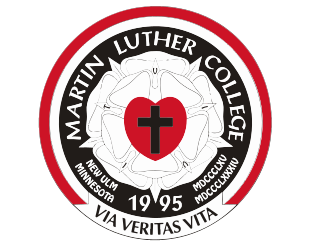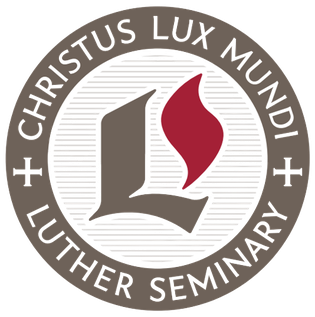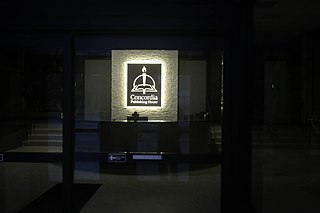
Manchester is a village in Manchester Township within Washtenaw County in the U.S. state of Michigan. The population was 2,037 at the 2020 census.

Mequon is the largest city in Ozaukee County, in the U.S. state of Wisconsin, and the third-largest city in Wisconsin by land area. Located on Lake Michigan's western shore with significant commercial developments along Interstate 43, the community is a suburb in the Milwaukee metropolitan area. Despite being an incorporated city, approximately half of Mequon's land is undeveloped and agriculture plays a significant role in the local economy. At the time of the 2010 census the population was 23,132.

The Lutheran Church—Missouri Synod (LCMS), also known as the Missouri Synod, is a traditional, confessional Lutheran denomination in the United States. With 1.8 million members, it is the second-largest Lutheran body in the United States. The LCMS was organized in 1847 at a meeting in Chicago, Illinois, as the German Evangelical Lutheran Synod of Missouri, Ohio, and Other States, a name which partially reflected the geographic locations of the founding congregations.

The Wisconsin Evangelical Lutheran Synod (WELS), also referred to simply as the Wisconsin Synod, is an American Confessional Lutheran denomination of Christianity. Characterized as theologically conservative, it was founded in 1850 in Milwaukee, Wisconsin.

The Concordia Theological Seminary is a Lutheran seminary in Fort Wayne, Indiana. It offers professional, master's degrees, and doctoral degrees affiliated with training clergy and deaconesses for the Lutheran Church–Missouri Synod (LCMS).
The Concordia University System (CUS) is an organization of six colleges and universities and one satellite campus in the United States that are operated by the Lutheran Church–Missouri Synod (LCMS). All of the institutions are named "Concordia"—a reference to the Latin title of The Book of Concord, the collection of Lutheran confessions—and all include professional church work programs as part of their curricula. The CUS was formed in 1992. As of 2011, 28,421 students attend Concordia University System institutions.

Concordia Seminary is a Lutheran seminary in Clayton, Missouri. The institution's primary mission is to train pastors, deaconesses, missionaries, chaplains, and church leaders for the Lutheran Church–Missouri Synod (LCMS). Founded in 1839, the seminary initially resided in Perry County, Missouri. In 1849, it was moved to St. Louis, and in 1926, the current campus was built.

Concordia University Wisconsin (CUW) is a private Lutheran university in Mequon, Wisconsin. It is part of the seven-member Concordia University System operated by the Lutheran Church–Missouri Synod (LCMS).

Wisconsin Lutheran Seminary (WLS) is a post-secondary school that trains men to become pastors for the Wisconsin Evangelical Lutheran Synod (WELS). It is located in Mequon, Wisconsin.

Martin Luther College (MLC) is a private college in New Ulm, Minnesota, operated by the Wisconsin Evangelical Lutheran Synod (WELS). Martin Luther College was established in 1995, when Northwestern College (NWC) of Watertown, Wisconsin, combined with Dr. Martin Luther College (DMLC) of New Ulm on the latter's campus.

The Evangelical Lutheran Synodical Conference of North America, often known simply as the Synodical Conference, was an association of Lutheran synods that professed a complete adherence to the Lutheran Confessions and doctrinal unity with each other. Founded in 1872, its membership fluctuated as various synods joined and left it. Due to doctrinal disagreements with the Lutheran Church–Missouri Synod (LCMS), the Evangelical Lutheran Synod (ELS) and the Wisconsin Evangelical Lutheran Synod (WELS) left the conference in 1963. It was dissolved in 1967 and the other remaining member, the Synod of Evangelical Lutheran Churches, merged into the LCMS in 1971.

Luther Seminary is a seminary of the Evangelical Lutheran Church in America (ELCA) in Saint Paul, Minnesota. It is the largest seminary of the ELCA. It also accepts and educates students of 41 other denominations and traditions. It is accredited by the Higher Learning Commission and the Association of Theological Schools. It also has theological accreditation through the ELCA as well as the United Methodist Church.
The Lutheran School of Theology at Chicago (LSTC) is a seminary of the Evangelical Lutheran Church in America in Chicago, Illinois. LSTC is a member of the Association of Chicago Theological Schools (ACTS), a consortium of eleven area seminaries and theological schools. It shares the JKM Library and portions of its campus with McCormick Theological Seminary. LSTC is accredited by the Association of Theological Schools and regionally accredited by the Higher Learning Commission.

Concordia Publishing House (CPH), founded in 1869, is the official publishing arm of the Lutheran Church–Missouri Synod (LCMS). Headquartered in St Louis, Missouri, at 3558 S. Jefferson Avenue, CPH publishes the synod's official monthly magazine, The Lutheran Witness, and the synod's hymnals, including The Lutheran Hymnal (1941), Lutheran Worship (1982), and Lutheran Service Book (2006). It publishes a wide range of resources for churches, schools, and homes and is the publisher of the world's most widely circulated daily devotional resource, Portals of Prayer. Its children's books, known as Arch Books, have been published in millions of copies. Concordia Publishing House is the oldest publishing company west of the Mississippi River and the world's largest distinctly Lutheran publishing house.

Inspector Georg Martin Grossman was a German-American Lutheran pastor, academic, missionary, and church leader who founded the Iowa Synod, Wartburg College, and Wartburg Theological Seminary.
The Evangelical Lutheran Joint Synod of Ohio and Other States, commonly known as the Joint Synod of Ohio or the Ohio Synod, was a German-language Lutheran denomination whose congregations were originally located primarily in the U.S. state of Ohio, later expanding to most parts of the United States. The synod was formed on September 14, 1818, and adopted the name Evangelical Lutheran Joint Synod of Ohio and Other States by about 1850. It used that name or slight variants until it merged with the Iowa Synod and the Buffalo Synod in 1930 to form the first American Lutheran Church (ALC), 1930–1960.

Concordia College was an educational institution of the Lutheran Church–Missouri Synod (LCMS) whose main purpose was to prepare men to enter one of the synod's seminaries. It was founded as a German-style gymnasium in Perry County, Missouri, in 1839. It was moved to St. Louis, Missouri, in 1847, and ultimately to Fort Wayne, Indiana, in 1861. In 1935, the high school department of the school was separated from the junior college to form Concordia Lutheran High School. Concordia College was closed in 1957 when the LCMS opened Concordia Senior College on a new campus in Fort Wayne..The former campus was purchased by the Indiana Institute of Technology.
The Lutheran High School of Milwaukee was a Lutheran high school operated by congregations of the Missouri and Wisconsin synods in the Milwaukee, Wisconsin, area from 1903 to 1955. Started in an unused classroom of Immanuel Lutheran School with 18 students, it moved in 1904 to the former site of the Wisconsin Synod's seminary at 13th and Vine streets. Enrollment increased to 340 in 1929 and led to construction of additional buildings at the site. The Great Depression caused enrollment to decline to 265 in 1938, but with the end of the depression, enrollment steadily increased to 848 in 1948. Plans were initiated to build a larger school at a new site, but doctrinal differences between the two synods resulted in the decision for each synod to build its own separate high school and dissolve the joint operation. The Missouri Synod congregations opened Milwaukee Lutheran High School in September 1955, while the Wisconsin Synod congregations used the old campus for their school, Wisconsin Lutheran High School, until their new building opened in September 1959. The enrollment in the final year of joint operation, 1954–1955, was over 1,100. Both of the successor schools consider 1903 to be their founding date.

Immanuel Lutheran College was an educational institution of the Evangelical Lutheran Synodical Conference of North America whose main purpose was to train Black men to be pastors and both men and women to be teachers. It was founded in Concord, North Carolina, in 1903 and relocated to Greensboro, North Carolina, in 1905. The college was closed in 1961 when the Synodical Conference decided that the training of Blacks should be integrated into the educational institutions of the Lutheran Church–Missouri Synod (LCMS), the largest member of the conference. The former campus was purchased by North Carolina A&T State University.
Luther College was a private black school in New Orleans, Louisiana, United States. It was established by the Evangelical Lutheran Synodical Conference of North America in 1903 as part of the conference's missionary work among African Americans in the Southern United States following the American Civil War. The school was founded the same year as Immanuel Lutheran College in Concord, North Carolina, and both schools had the same three departments: a secondary school, a normal school, and a seminary.






















